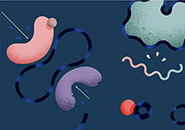For millions of years, bits of DNA called retrotransposons have been duplicating and inserting themselves randomly throughout the genomes of different organisms, including humans. Sometimes the jumping genes alight in places that help species evolve new traits. Other times they do nothing. But all too often they touch down in the middle of a gene, altering the way it’s regulated or knocking it out of commission. Fortunately, as HHMI Investigator David Haussler recently showed, cells have evolved a way to keep these wayward sequences in check.
“Over generations, our genome becomes bloated with copies of retrotransposons,” explains Haussler. “They do damage by disrupting normal genetic mechanisms. Something has to be the security patrol to try and shut these things down.”
In humans, one form of security patrol comes from more than 400 rapidly evolving genes that produce watchdog proteins called KRAB zinc-fingers. These watchdogs scan the genome, clamp onto retrotransposons, and then call on other proteins to silence them.
To see KRAB zinc-fingers in action, Haussler’s team at the University of California, Santa Cruz, used mouse cell lines containing a copy of human chromosome 11, which includes hundreds of retrotransposons commonly found in primates like humans, but not present in rodents. Since mice have rodent-specific KRAB zinc-fingers to control their retrotransposons, the rodent cells couldn’t stop the rogue human retrotransposons from expressing themselves. That is, until the researchers added two human KRAB zinc-fingers—ZNF91 and ZNF93—that halted the primate-specific retrotransposons in their tracks. The team published its findings September 28, 2014, online in Nature.
Haussler explains that mutations in retrotransposons allow them to escape detection by the KRAB zinc-fingers, which in turn drives the evolution of new KRAB zinc-finger genes. “By reconstructing molecular evolutionary histories, we can see that these KRAB zinc-finger genes have been major players in this battle with the retrotransposons and will probably continue to be so,” he says.
There is a silver lining in this seemingly endless arms race within our own DNA. Once KRAB zinc-fingers are no longer needed to suppress retrotransposons, many of these watchdog proteins adopt new roles as regulatory proteins, controlling the activity of genes near retrotransposon landing sites.








